“Unless we use modern technologies, our farmers
output will remain low
and we will remain dependent on other to feed
us”
AGRICULTURE:
Investments in agriculture are the best weapons against hunger and poverty and they have made life better for billions of people.
TECHNOLOGY:
The use of technology in agriculture with the aim of improving yield, efficiency and profitability.
AGRICULTURAL TECHNOLOGY:
We refers to the use of technology in farming and agricultural practices to increase efficiency, productivity and sustainability in food production.
It includes several different types of technologies such as,
- Precision agriculture
- Smart irrigation
- Bio technology
- Automation

STAFF DETAILS
| S.NO | NAME | QUALIFICATION | DESIGNATION |
|---|---|---|---|
| 1 | ESWARAKKANNAN P | B.E [MECH] | HEAD OF DEPARTMENT |
| 2 | SOWMIYA A | B.E [AGRI] | LECTURER |
| 3 | RAJESH V | B.E [MECH] | LECTURER |
| 4 | DHIVYA P | B.E [CIVIL] | LECTURER |